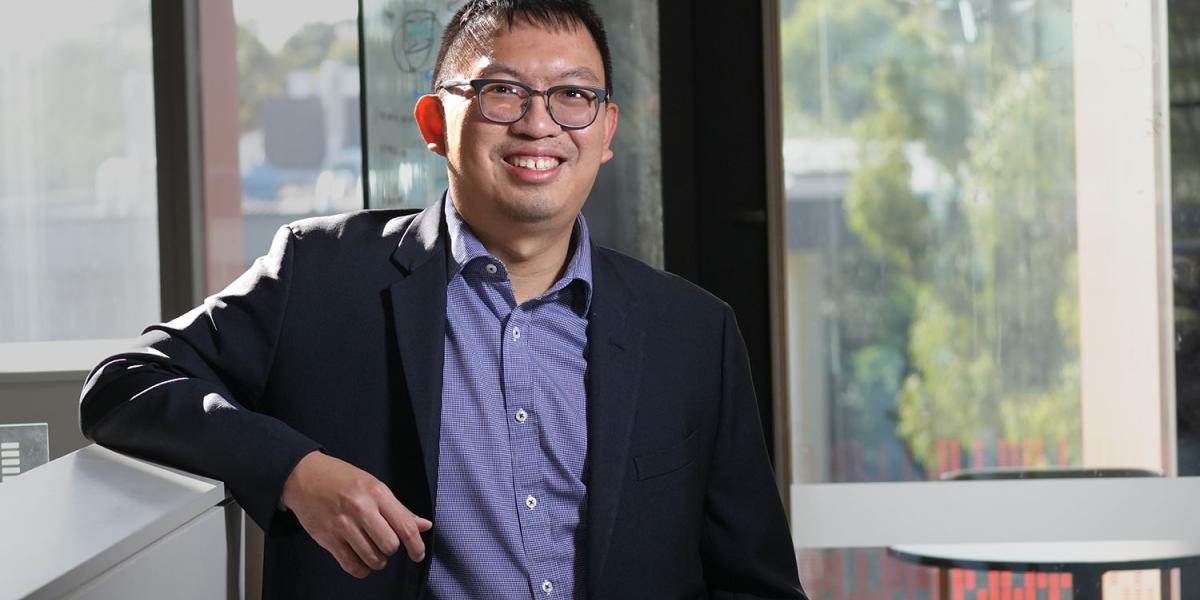Scholar Feature
For Yuan-Sen Ting, an associate professor in the Department of Astronomy at The Ohio State University, artificial intelligence is not just a tool for faster calculations — it is reshaping how science itself is done.
He is a co-lead author of “The Future of Artificial Intelligence and the Mathematical and Physical Sciences,” a white paper that explores how NSF-supported research in fields such as astronomy, chemistry and materials research can both capitalize on and contribute to the future of AI across research and education. Ting also discussed this topic in a recent Science Sundays talk titled “How Is AI Changing Science?” where he challenged common myths about AI and emphasized its role as a collaborator rather than a replacement for human researchers.
“AI can be superhuman, but also subhuman,” Ting said. “It’s not perfect — it has blind spots.” He said the key is learning to work with it as a partner, to guide it where it falls short.
He also recently authored “Deep Learning in Astrophysics” for the Annual Review of Astronomy and Astrophysics, one of the field’s most prestigious journals.
An international journey shaped by curiosity
Ting’s fascination with science began in Malaysia, a small country in Southeast Asia, where he grew up before pursuing his undergraduate and master’s degrees at the National University of Singapore and École Polytechnique in France through a dual-degree program. His academic path later took him to Oxford University, the Australian National University and the Max Planck Institute, where he completed his thesis and internships. He earned his PhD at Harvard and subsequently received a joint fellowship that included the NASA Hubble Fellowship. Ting spent most of that period at the Institute for Advanced Study in Princeton, while also being affiliated with Princeton University and the Carnegie Institution for Science. After serving as a faculty member at the Australian National University, he relocated to the United States to join Ohio State.
“I never thought I would become an astronomer,” Ting said. “Astronomy is largely not a thing in a small country like Malaysia. But I was always fascinated by mathematics and physics.” He said one thing led to another, and astronomy became the perfect sandbox — a space “to explore the intersection of all my interests, from mathematics and statistics to physics and now AI.”
Since joining Ohio State in 2024, he has continued to pursue research that sits at the intersection of statistics, AI and astrophysics.
Redefining how scientists work
Ting said he’s a trained astrostatistician — a researcher who applies statistical methods to astronomical data. His current work focuses on three major areas where AI could transform astronomy: modeling starlight and stellar spectra, developing self-driven AI-powered laboratories, and exploring philosophical questions about how knowledge evolves in the age of AI. “As AI is actively changing how we do science,” Ting said, “this poses another layer of complexity — what is science? What constitutes doing science?”
In his daily work, Ting said AI has already transformed how he conducts research — from quickly digesting scientific papers to writing code alongside AI systems. “AI as a copilot has drastically changed how we do science,” he said.
He emphasized that researchers now need to be both experts in their disciplines and fluent in AI literacy. “Having AI as a copilot isn’t something I discourage,” Ting said. “In fact, I encourage students to explore that.” But he added that researchers also need to think deeply about its legal, philosophical and identity implications.
Teaching the next generation of AI-literate scientists
Ting believes everyone should be AI literate, and he puts that philosophy into practice in his own courses. In his coding and statistics class, he uses AI quiz bots that generate coding problems — including intentionally flawed examples — to help students learn debugging and critical thinking. He developed an AI “tutor” that draws on his course materials, allowing students to revisit lectures, ask personalized questions and receive tailored feedback. “There are areas where AI clearly does better,” Ting said. “These tools give students a more holistic education that traditional methods alone cannot achieve.”
Still, Ting cautions against overreliance on technology. “What’s most important as an educator is cultivating human intuition,” he said. “There are things that are very hard to communicate through text alone.” He said the delivery from professors — the human spark — remains irreplaceable.
Beyond the hype: Finding balance and perspective
Ting rejects both the doomsday fears and the exaggerated promises often surrounding artificial intelligence. “The biggest misunderstanding is that AI can solve everything,” he said. “In reality, the problems AI can uniquely solve are still a small subset.”
He sees AI as a powerful aid, not a replacement for human creativity. “AI makes things easier and faster and opens up new possibilities, but it’s a means, not an end,” Ting said. “I’m excited but not worried about AI — it’s a tool to help us tackle the hardest problems. And if I’m proven wrong, I’ll learn something about my own blind spots.”
Finding a “Goldilocks zone” in Columbus
As an international scholar, Ting said his experience at Ohio State and life in Columbus have been unexpectedly rewarding.
“I’m somewhat of a world nomad,” Ting said. “In the U.S., I spent almost a decade on the East Coast. At first, I wasn’t sure I would get used to the Midwest lifestyle, but the city is really growing on me.”
He compares life in Columbus to the Goldilocks zone in astronomy — a region where a planet is not too close to its star and not too far away, but just the right distance for life. For Ting, Columbus, with its slightly slower pace of life, is his own Goldilocks zone — “an ideal place for research.” He said Ohio State attracts brilliant minds, while the city offers space to think and create.
This story was written by Ingrid Rivera, communications and public relations associate for International Students and Scholars in the Office of International Affairs.
